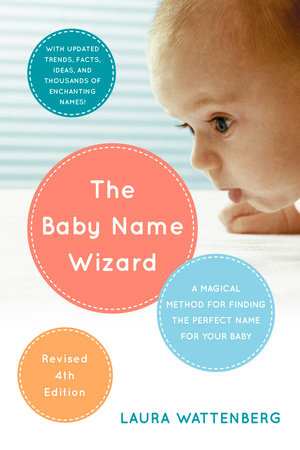Excerpt
The Baby Name Wizard, Revised 4th Edition
Why Is This So Hard?
It’s not your imagination. Choosing a baby name really is harder today than in your parents’ and grandparents’ times.
Over the past generation, we’ve experienced a naming revolution. We’ve moved from an established pool of “normal” names to a wideopen, anything-goes name culture, with a premium on creativity and uniqueness. And that means pressure.
To put it in numerical terms, back in the 1950s, about 80 names were enough to account for the majority of American boys and girls born. Names like Michael and David were super popular with every demographic group in every corner of the country. By 2017, it took 504 names to cover half of boys and girls. The typical American baby received a statistically uncommon name, often one specific to his or her community. In other words, there’s no longer such a thing as a “normal” name.
That makes the process of choosing vastly more difficult. Having a wide-open choices sounds like freedom, but in practice it can be a trap. Imagine ordering a meal in a restaurant where the menu is 20 pages long. The more options you have, the less certain you feel, and the more your expectations rise. Surely, you should be able to find something that’s not just good, but
perfect. Even after choosing, you may be left with doubt and tempted to second-guess your decision. Sound familiar, baby namers?
In the realm of baby names, that wide-open choice is particularly significant. Choosing from a restaurant menu is just about pleasing yourself. A name is also a signal to others. Back in the heyday of Michael and David, or John and Mary, or even Jason and Jessica, you wouldn’t draw a lot of conclusions about most individuals from their names. They were just wearing the standard American baby name uniform. Now that we’ve done away with uniforms, name choices send stronger signals. Looking at a class list of Eleanor, Oakleigh, Santiago, Jazzmyn, Declan, and Messiah, we can’t help but form mental images. In this environment, even naming kids John and Mary makes a statement.
What’s more, in the modern world where so many interactions are virtual, names are bearing a bigger burden of first impressions. From email to dating and ride-sharing apps, our names are becoming our entire calling cards. A bevy of studies have shown that people respond differently to digital messages depending on the names attached.
So that’s what you can explain to your grandparents when they wonder why you’re making such a big deal about choosing a name. It has gotten harder, and it matters more. Now here’s what you can do to depressurize the naming experience: follow a path.
Notice that this book doesn’t proudly promise more name listings than its competitors. (“100,000 BEST Names for Baby!”) You’re looking for a needle in a haystack; the last thing you need is a bigger haystack. Instead, BNW tries to help you find the small set of names that speak to your heart.
Start with a few names you really like. Look them up, see what sibling suggestions are listed for them and what style categories they belong to. Start to get a feel for what they have in common. If you and your partner start off with different tastes, look for areas of overlap. You should find yourself zeroing in on a group of great names. And the way a great name becomes a perfect name is by belonging to your child
A Note on Popularity
A generation ago, there were no baby name popularity statistics. Whether parents wanted unique names that would set their children apart, or fashionable names that would help them fit in, they had to guess based on their own experience. Today we have far more information. We can check rankings and popularity curves, and try to project where a name is heading.
It turns out that nobody wants to be #1. Armed with rankings, many parents now rule out names that have climbed too high on the popularity charts. They’ll reject anything ranked in the top 10, or even the top hundred or top thousand. They want a name that’s special, not ordinary; one that their kid won’t have to share with anyone else in her kindergarten class.
If fear of popularity has you crossing off all your longtime favorite names, let me try to offer some reassurance.
First and foremost:
popular just means well-liked. Nothing more. The name Emma climbed to the top of the charts because across the country, people from all walks of life really, really like the name Emma. Having a name that people respond to so positively can be an advantage. The fact that others may share that name doesn’t make the name, or the person behind it, any less special. Just ask some people with super-common names, like Michael Jackson, Jennifer Lopez, and Elizabeth Taylor.
Secondly, be aware that even a #1 name isn’t what it used to be. Today’s top names are only a fraction as popular as Michael and Jennifer used to be, and even those hits didn’t approach the heights that John and Mary used to reach. As recently as 1980, 22 different boys’ names were each popular enough to be borne by at least 1% of boys. Today, not a single name reaches that threshold. In our new creative naming world, truly “ordinary,” super-popular names have essentially ceased to exist.
Yes, popularity does matter. It’s part of each name’s unique style and identity, and helps define its place in our culture. But don’t stress too much about the rankings. These days, you can find high-impact, highstyle names at every ranking level.




